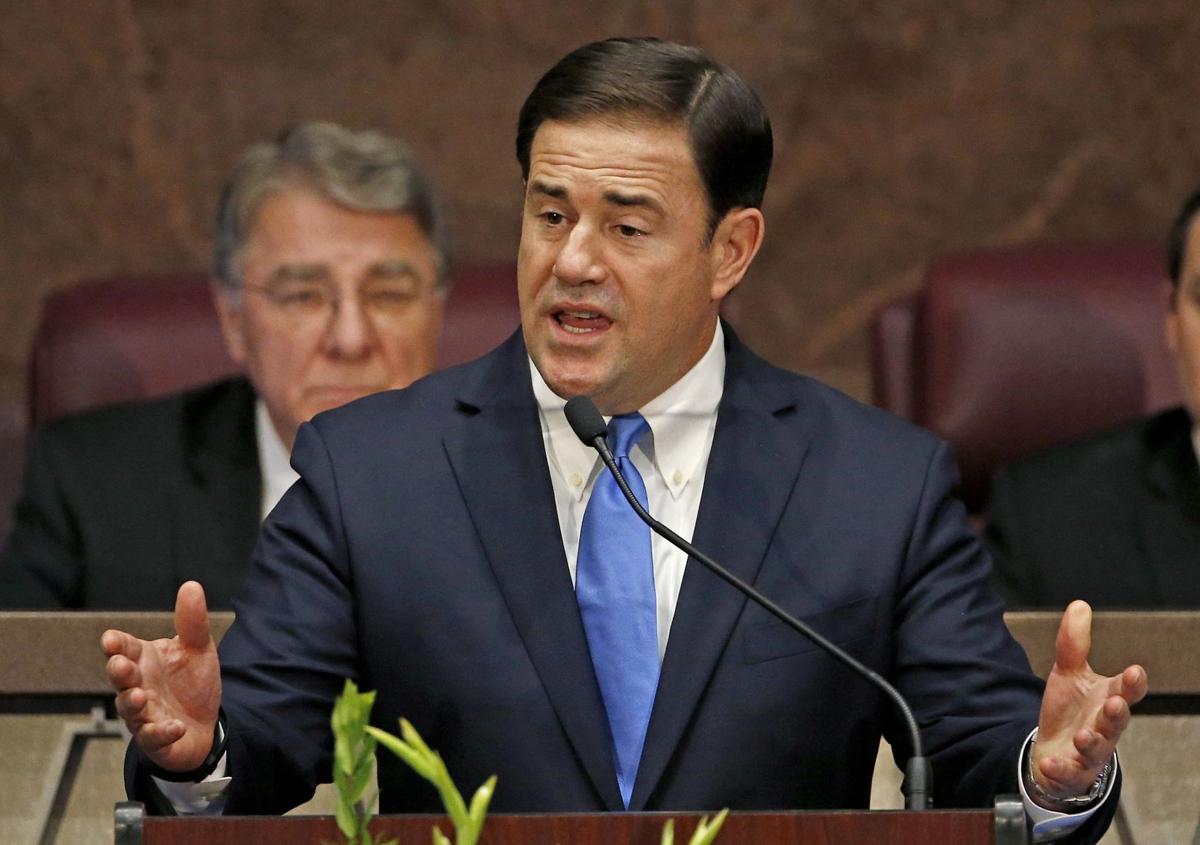PHOENIX — Gov. Doug Ducey is offering the average Arizona teacher a $900-a-year raise — by 2022.
The governor Friday unveiled his plan to put $114 million in new funds into K-12 education for the coming fiscal year. That is on top of $76 million that schools will get automatically because of increases in enrollment as well as inflation.
But the governor’s big promise during his State of the State speech earlier this week of “recognizing and rewarding the work of our teachers” would produce $13.6 million this coming year.
The National Education Association puts the average teacher salary in Arizona at $45,477 a year, the lowest in the nation. With close to 60,000 teachers in the state, that first-year funding comes out to just $225 per teacher.
Joe Thomas, president of the Arizona Education Association, said he appreciates the governor putting more than $100 million in new funding into public schools. But he said the amount Ducey has earmarked for teacher salaries won’t achieve the governor’s goal of recruiting and retaining teachers.
“I don’t know that a dollar a day is going to be the difference between someone staying and someone leaving,” he said.
Sen. Steve Farley, D-Tucson, pointed out that about $89 million of what the governor is calling new spending is coming from shifting gasoline taxes and vehicle registration fees from the account that otherwise would fund road construction and repair.
Gubernatorial press aide Daniel Scarpinato said the teacher salary plan is the best his boss can do given the state’s revenue situation.
“We don’t think we can ever do enough to reward our teachers,” he said. “And so we’re doing what we can this year with available dollars.”
Thomas, however, said the claim of limited dollars is self-inflicted, citing a series of tax breaks approved during the recession. The result is that corporate income tax collections, which were $571 million last year, will be less than half that much by 2020.
House Speaker J.D. Mesnard, however, defended those tax cuts, saying they “help grow the economy.”
But after accounting for one-time expenditures, Ducey’s $9.8 billion budget for the new fiscal year is a 1.8 percent increase. That’s less than what would be normal spending growth just to keep pace with inflation and population growth.
The governor also is proposing a small tax cut, about $2.8 million, by indexing the amount of the standard deduction on Arizona’s personal income tax form.
There is some new money for universities, but nowhere near close to the $99 million Ducey cut in his first term. Instead, there is a one-time $15 million no-strings-attached appropriation the schools can use for whatever they believe are priorities.
That’s being divided up based on student enrollment, with slightly more than half going to Arizona State University, $3.2 million to Northern Arizona University and nearly $4.2 million for the University of Arizona.
The governor also proposes to let the universities keep about $37 million they generate in sales taxes from commercial enterprises on campus. That would provide enough cash flow to borrow $1 billion for 30 years to fund maintenance, which has been put off, as well as new research and development projects.
Gubernatorial staff said that’s new money for universities, freeing up what they would otherwise spend on borrowing. But it also comes at a $7 million loss in state sales tax revenue for the three cities where the universities are located.
Other goals
In defending the teacher-pay plan, Scarpinato said Ducey’s long-term goal is to increase teacher salaries by 2 percent over five years. While that is less than inflation, Scarpinato said school districts are free to use other funds to supplement teacher pay.
He also said the budget has other education funding including:
- $10 million for schools in the poorest neighborhoods for full-day kindergarten or other programs designed to help ensure students are ready to read by third grade;
- A $1,000 bonus for new teachers who agree to go to work at schools in some poor areas of the state;
- Adding $250,000 to a $170,000 account to forgive college loans for those who agree to teach math, science and special education;
- $38 million in bonuses for schools whose students, on average, score in the top 10 percent statewide in the AzMERIT test, with high-poverty schools getting a $400-per-student bump and $225-per-student extra for schools with more affluent students;
- $5 million to expand broadband internet access into rural schools;
- $20 million for schools who have signed contracts with teachers for the coming school year but enrollment is less than forecast.
The governor, also, has directed the universities to provide scholarships to those who are willing to teach for at least four years. Ducey’s budget includes no new money for what that would cost the schools.
Ducey is putting $17 million in funding for construction of new schools statewide and repairs to existing ones.
Lawmakers assumed that responsibility after the Supreme Court ruled more than two decades ago that leaving that to local taxpayers resulted in gross inequities. Scarpinato said it comes down to priorities.
“What we really tried to do with building this budget is look at where are the dollars we invest that we have going to make the most difference,” he said.
But Mesnard said he is “concerned for legal and structural reasons.”
Education issues aside, Ducey’s budget includes about $20 million in additional funds for state agencies to reimburse private contractors who, in the wake of approval of Proposition 206, now have to pay their workers who care for the disabled and others at least $10 an hour.
It does not have an across-the-board pay hike for what the governor in his State of the State speech called Arizona’s “talented state employees.” The last general raise was in 2008, though employees who agreed to surrender merit protections got a 5 percent boost in 2014.





